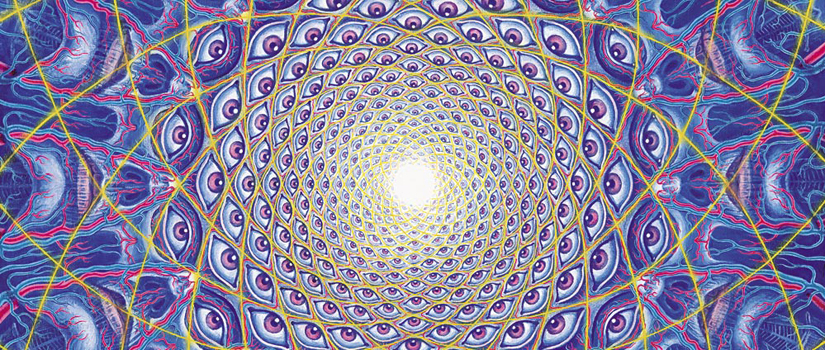IMMORTALITY, SHAKESPEARE AND YOUR GRANDMOTHER
Ken Taub
WHEN THE DOORBELL RANG, I was surprised. I wasn’t expecting anyone — surely not the Jehovah’s Witnesses.
We chatted very briefly, exchanging pleasantries, when they suddenly hit me with, “How would you like to live forever?” “That would be positively vampiric,” I replied. The conversation went quickly downhill from there.
This was years back, and in the interim guess what I did? Correct, I aged. I got closer to the front of the line — as in my mortality. Despite that brick-in-the-nose fact, I haven’t changed views on my own personal End Times. Living for 50, 75 or 100 years is tough enough. How would passing 500 or 1,000 be?
Strange, yes, but also dreary, repetitive and in ways perhaps downright surprising, profoundly sad.
Now, I love the earth, and I love the oceanic chemistry of love, adventuring to new places and meeting new people. I love hiking just about any trail, running, food, hot coffee, long kisses, a warm shower, another soapy body in the shower, ocean swims, the setting sun painting the sky at dusk, and playtime with the pups. In short, I love being alive.
But life is transitory. The party is a brief one. Things age, rust, decompose, die. All things come into being to one day be no more. No one says Whoopee! when they see Dracula. Vampires are not called the endlessly alive, they’re called the undead, and for good reason.
Clearly, I don’t want any neck bites from soulless transgressors with dramatically pale skin, and neither do I wish to occupy a never-ending picnic grounds in the sky. The Jehovah’s Witnesses might as well have been trying to sell Tupperware to a bachelor who never cooks.
Besides, there are far better ways not to die.
Everyone alive today — you, me and everyone we have ever encountered — represents the current end point in a long chain of being. Our rather adept ancestors — the clever, fit or fortunate human beings who preceded us — live on in us. Not only genetically, but in the Long Arc, in the unfolding of the entire human story over multiple millennia.
With this aerial perspective, my wonderful grandmother Jennie, who passed away in 1965, lives on in me, and in the same way I will live on in my son, and in his offspring should he choose to breed sometime in the coming years.
Not all of us have children, and not all of us predecease our children, and not all of our children have children, but if they do then the moment you hold your first grandchild, your every atom and your clever strands of DNA coo along with your heart, because you intuitively know you have made it. For good.
Offspring are nature’s answer to inevitable decay. The cry of the newborn is the off-switch to mortality.
But even without offspring, human beings can live on and on, nearly forever. Who lives longer than Dracula? His creator, Bram Stoker.
If you’re a writer, and your written works live on well past your physical body, has not the essential core of you — everything that made your life unique, colorful, vibrant and worth sharing — lived on in your books, your plays or your poems?
Is Shakespeare dead?
Surely Shakespeare was alive when he performed at the Globe Theater himself in one of the plays that he had authored. Yet, he was also alive, and present, when one of his plays was performed 40 miles away, with clever Will not in the cast or otherwise there in the flesh.
So long as he is read and performed, discussed and appreciated, Shakespeare lives. The Bard is vibrantly alive, as is Socrates, Hippocrates, Bach, Mozart, Dostoevsky and Dickens.
No kids, and no great books, art, or music of your own making to leave behind? Not even a large library in some big city named after you?
Fret not.
Perhaps you helped provide the paper for a great book or transported a great work of art, or a piece of it, or helped build the edifice that housed the esteemed library. Or maybe you cast one of the deciding votes for Abe Lincoln or John Kennedy. Maybe you marched with Martin Luther King Jr. Perhaps you lent a hand to a poor soul who became the grandparent of a Helen Keller or an Oprah Winfrey. Perhaps you were of help and significance to a teacher who influenced Warren Buffet or Bill Clinton. Maybe you delivered the milk to young Dwight Eisenhower or Ronnie Reagan.
The greats not only sit on the shoulders of other giants, they sit on the shoulders of all humanity. No genius ever accomplished something great from scratch, and by his or her lonesome, away on some far island.
When it comes to humanity there are no islands.
We’re all in this together. We cheer when someone does something great because we are of the same fabric; we are not only in the stands watching and whooping, we are in the kitchens, factories and fields, pitching.
We feed, house, clothe, and lift one another. Our children, others’ children, our friends and neighbors, the great and talented; we have raised and nurtured them. We are only human beings insofar as we do our being together.
We are not only a giant weave of interconnected energies and accomplishments, we are a fabric that never comes fully apart. We fray and we scorch, but we don’t come apart. We go on.
Your grandparents, indeed, all your ancestors, are alive in you. Shakespeare, Picasso, and Lennon live on in every single soul who reads, looks and listens. You too will live on in the generations that follow, even without a smash hit, a hospital wing named in your honor, or a best seller.
Human immortality? It is the thing as true as death itself.
Who never dies? Mankind. Someone, I don’t know who, and it doesn’t much matter, once said, “Mankind is the person who never dies.”
Whoever they were, they were wonderfully correct. They were also you. And me. The person who said that was someone, and he was all of us.
Ken Taub is a New York-based independent advertising and marketing consultant, copywriter and freelance writer, and co-owner of a yoga studio, with a background in philosophy and a degree in Chinese Studies.. Contact: kenja@optonline.net or go to www.kentaub.com.
Ken Taub, Associate Editor




Ultimately, what any of us have is the now. The now doesn't die even if it usually, but not always, evolves. When taking the form of a light beam where time doesn't, and can't, exist, the now can't be destroyed unless the universe itself unimaginably ceases.
So, one may try to trick the fates and live on past your biological lifetime but, one day there'll be no evidence that life ever existed on our planet. And, when that finally comes, no one will be conscious of the nows that ever exist, the pasts that did exist, and the futures that may exist. But no one can ever take away the nows that were ours when we were here, fully conscious.